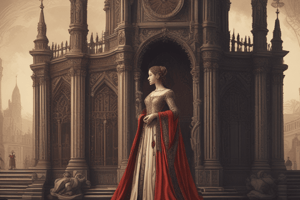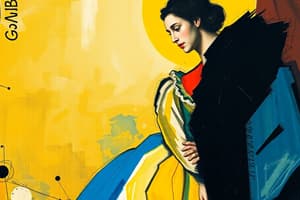Podcast
Questions and Answers
In the context of the provided text, what is a primary critique associated with the Roman Catholic Church's approach to salvation?
In the context of the provided text, what is a primary critique associated with the Roman Catholic Church's approach to salvation?
- It is seen as inherently democratic, allowing individuals to interpret religious texts independently.
- It overemphasizes personal responsibility, neglecting the role of divine grace.
- It is viewed as exploitative, requiring submission to clerical authority for salvation. (correct)
- It promotes individual autonomy, undermining the communal aspects of religious faith.
How does the text characterize the role of religion in 'The Duchess of Malfi' (DoM)?
How does the text characterize the role of religion in 'The Duchess of Malfi' (DoM)?
- Religion is largely irrelevant to the plot and character development.
- Religion is primarily depicted as a tool for corruption and manipulation. (correct)
- Religion is portrayed as a source of comfort and hope, especially in the face of death.
- Religion is a consistently positive force, guiding characters towards moral decisions.
What does the text suggest about Eve's inclination to disobedience in relation to free will and misogyny?
What does the text suggest about Eve's inclination to disobedience in relation to free will and misogyny?
- Eve's inclination to disobey, combined with her choices, reinforces archetypal misogyny. (correct)
- Eve's disobedience is portrayed as a strength, proving her intellectual superiority.
- Eve's actions are solely driven by a desire for knowledge, devoid of any religious implications.
- Eve's choices are inconsequential, as she is merely a puppet of fate.
How are the punishments in Milton's works related to his concept of justice?
How are the punishments in Milton's works related to his concept of justice?
In what way does the text suggest that characters in 'The Duchess of Malfi' are similar to Milton's presentation of Calvinist predetermination?
In what way does the text suggest that characters in 'The Duchess of Malfi' are similar to Milton's presentation of Calvinist predetermination?
What dichotomy does the text highlight in relation to Satan and God?
What dichotomy does the text highlight in relation to Satan and God?
What is the significance of the Duchess turning to religion despite her transgressions?
What is the significance of the Duchess turning to religion despite her transgressions?
What is implied by the Cardinal's manipulation of Julia using the holy bible?
What is implied by the Cardinal's manipulation of Julia using the holy bible?
Based on the text, how does 'Paradise Lost' portray the relationship between Adam, Eve, and God after the Fall?
Based on the text, how does 'Paradise Lost' portray the relationship between Adam, Eve, and God after the Fall?
What contrast is drawn between the presentation of religion in 'The Duchess of Malfi' and 'Paradise Lost' regarding corruption?
What contrast is drawn between the presentation of religion in 'The Duchess of Malfi' and 'Paradise Lost' regarding corruption?
Flashcards
Religion as an oppressor
Religion as an oppressor
Religion can be used to oppress and subjugate individuals, particularly women, by reinforcing misogynistic views.
Predestination
Predestination
Characters' fates are predetermined, linking to ideas of destiny and lack of free will.
17th Century Religious conflict
17th Century Religious conflict
Religious anxieties were prevalent in the 17th century, during a cultural conflict between Protestants and Catholics.
Religion ineffective
Religion ineffective
Signup and view all the flashcards
Cardinal's Corruption
Cardinal's Corruption
Signup and view all the flashcards
Religious Authority Abuse
Religious Authority Abuse
Signup and view all the flashcards
Conflicting views of religion
Conflicting views of religion
Signup and view all the flashcards
Corruption's source
Corruption's source
Signup and view all the flashcards
Satan vs God
Satan vs God
Signup and view all the flashcards
Punishment and submission
Punishment and submission
Signup and view all the flashcards
Study Notes
- "He is a melancholy churchman" - Antonio
- "You may thank me. I pray thee kiss me. Still you are to thank me" - Cardinal to Julia
Religion as an Oppressor and Mouthpiece for Misogyny
- Subservience of Adam and Eve; they didn't choose their place
- Contextual link to Milton's rejection of the Calvinistic notion of predetermination
- Similarly, the characters in The Duchess of Malfi are predestined in a way
- Reference to the Wheel of Fortune and the idea of a sealed fate
- Is this fate religious and linked to free will?
- Webster was writing at a time of religious corruption, for example, the court of King James I
- Adam manipulated God's authority as a way to oppress Eve
- Link to Cardinal using his authority over Julia (her death)
- Religious anxieties were high in the 17th century, with Milton writing within a culture war between Protestantism and Catholicism
- "I have bound thee to't by death" - Cardinal poisoning Julia with Holy Bible - hermeneutical perversion
- Bowers suggests that Eve is inclined to disobedience when alone; however, her first independent decision is correct
- This suggests that her inferiority is of faith, not of intellect, yet she pays gravely for this
- Her choice contributes greatly to archetypal misogyny
- Why would God make Eve inherently curious?
Religious Justice/Eschatological Redemption
- "Like diamonds, we are cut with our own dust"
- Despite the Duchess' religious transgressions, she still turns to religion and finds hope in the notion of eschatological redemption
- This could be seen either as an art of desperation or an appeal to the intrinsic inclination towards religious beliefs which underlies psychological frameworks
- The Duchess' rejection of religious validity would have resonated with a 17th-century audience who were leaning towards Protestantism and away from arbitrary church teachings
- After the fall, Adam and Eve are punished by God
- Despite their transgressions, and particularly Eve's dedication to her alternate beliefs, the pair end up willingly submitting to God
- Eve's divine authority with book X ending in a tautological catharsis, whereby we see a "reditus" to natural order
- This can again be viewed from dual perspectives
- God is manipulative; Adam and Eve repentance is not genuine, but governed by fear
- As their creator, Adam and Eve are inherently inclined to subservience
- Milton & proportionality of justice
- The punishments of Adam and Eve are related to the roles they failed to fulfil
- Satan's too - he transgresses into a realm that he is unwelcome in, refusing to accept his place in the hierarchy as an outcast
- As such, he is forced to grove below those he attempted to live alongside
- Proportional handling of crime and punishment is arbitrary and excessive
- There are questions about fate, the character's predetermination, how much the character has a role in their own tragedy, and if the neglect of faith & piety is the reason for moral chaos
Corruption and Perversion of Religion
- Dom. The Cardinal and his mistreatment of religious authority, explained in relation to Julia, Duchess, Bosola
- This includes mistreating and controlling Duchess, poisoning a holy bible and killing Julia, and using Bosola and his need for social advance to carry out his own misdeeds
- The Roman Catholic Church assured salvation to individuals who submitted to clerical authority, which is clearly exploitative; specifically in a modern audience
- It could be argued that God is immoral to create Adam and Eve inherently curious, in a garden of paradoxical paradise, only then to offer them salvation should they deny their inherent nature
- In the same way that the Cardinal manipulates Bosola as a mouthpiece for his own ambitions & actions, God creates Adam and Eve to fulfil his ambitions for humanity by procreating
- Both figures exert excessive control over seemingly inferior figures, using their religious authority to elevate themselves to positions of superiority
- The role of religion in Dom; characters acknowledge the danger of sin, hell, the devil
- Despite this, figures aren't deterred from sinning, even egregiously
- Religion is not a force for good
- Duchess' conflicting view of religion; hopes for afterlife mean she can die in peace
- However, in life, she seems to view religion as Superstition
- For example, when devising an escape plan Bosola suggests pretending to go on a pilgrimage
- Coriola says not to "jest with religion" & Duchess calls her a "superstitious fool."
- Cardinal @Duchess: marking "religion her riding hood."
- Overall, religion is acknowledged but ignored.
Dichotomy of Satan and God
- "The reason why the poem is so good is because it makes God so bad." - Epsom
- "Milton's devil as a moral being is far superior to his God." - Percy Shelley
- Whist religion in Dom is presented as a tool for corruption, in PL corruption occurs because of an anti-religious force
- Satan is a force of destruction in contrast to God as a creator force
- Eve blasphemes "not following thee, I had remained in ignorance," to Satan after eating apple as the calls God "our great forecloser"
- Same inversion and religious tragedy imagery
- When Adam eats from the tree it "tastes so divine", calls the tree the virtuous tree, and Eve reveres Asatan as Adam reveres Eve
- Sin and Death are failed Adam and Eve instructed to cause havoc and destruction, not "be fruitful and multiply"
- In Paradise Lost, the role of "religion" is more fundamental, demonstrated more as the idea of Obedience to God
Studying That Suits You
Use AI to generate personalized quizzes and flashcards to suit your learning preferences.




